仁爱版八年级英语上册Unit 1Topic 1 I'm going to play basketball. SectionA PPT(43张无素材)
文档属性
| 名称 | 仁爱版八年级英语上册Unit 1Topic 1 I'm going to play basketball. SectionA PPT(43张无素材) | 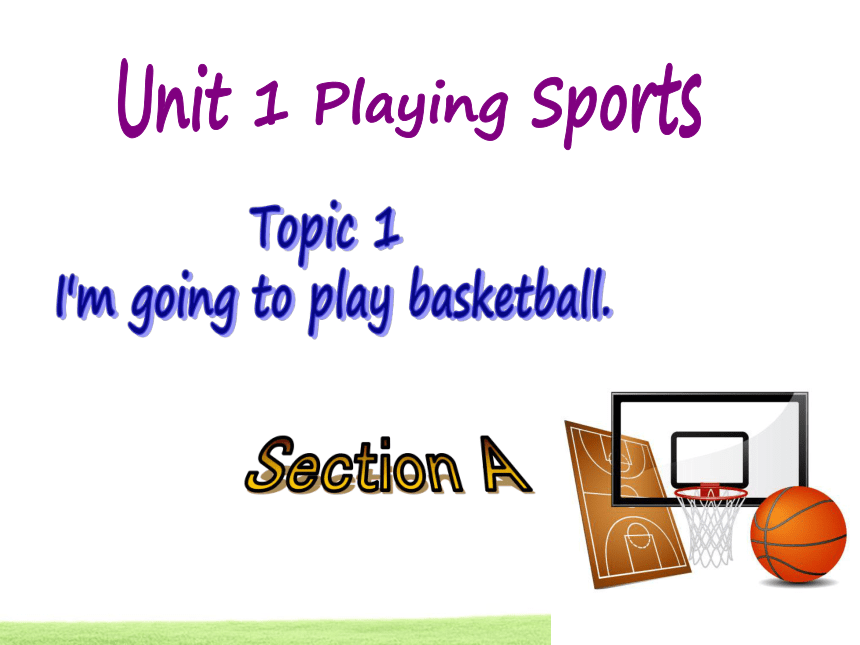 | |
| 格式 | zip | ||
| 文件大小 | 2.5MB | ||
| 资源类型 | 教案 | ||
| 版本资源 | 仁爱科普版 | ||
| 科目 | 英语 | ||
| 更新时间 | 2019-09-17 09:08:54 | ||
图片预览

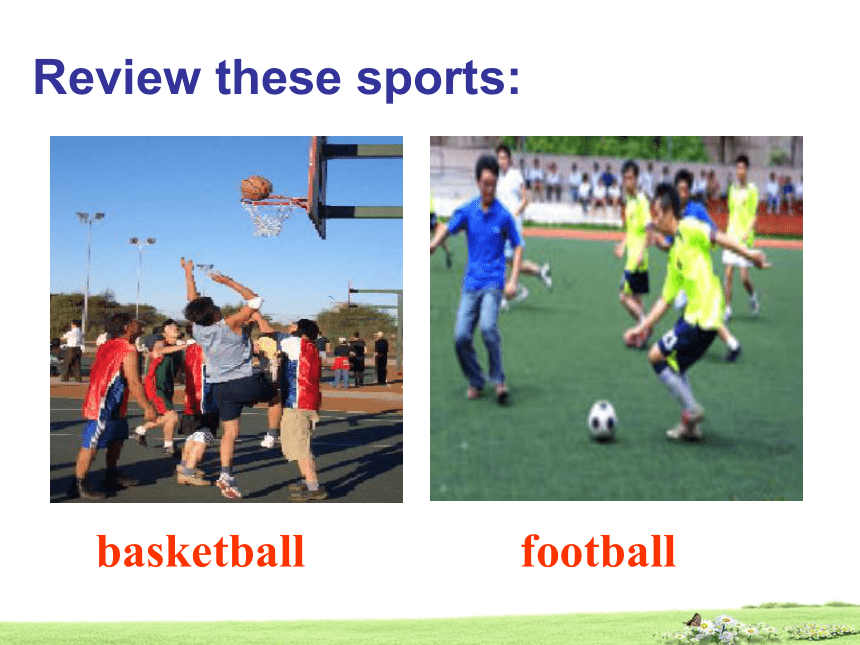
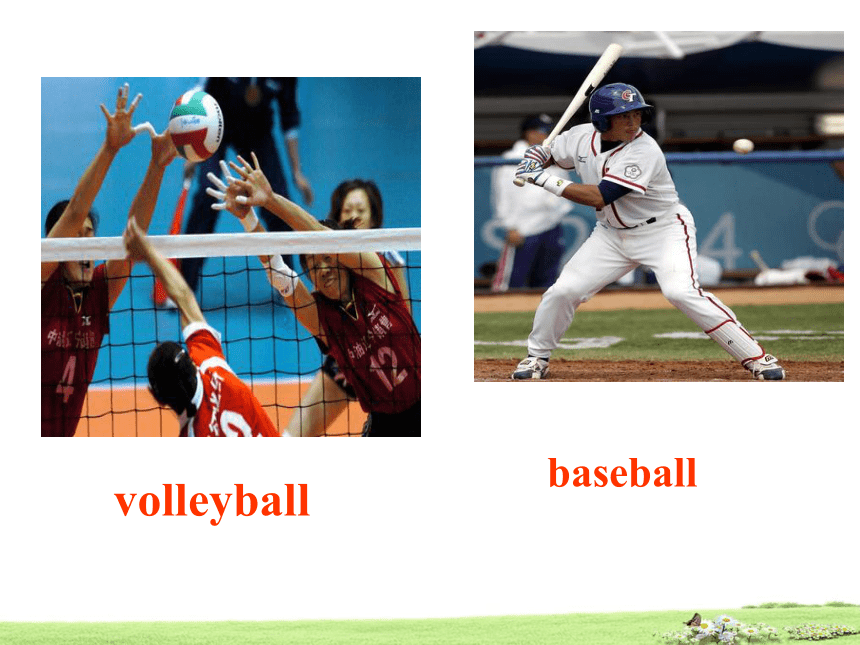
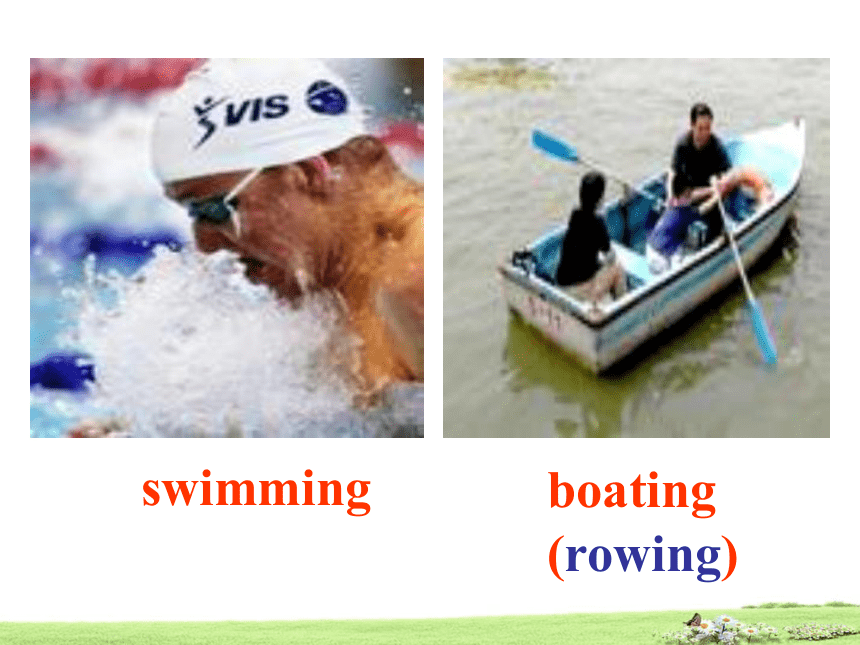
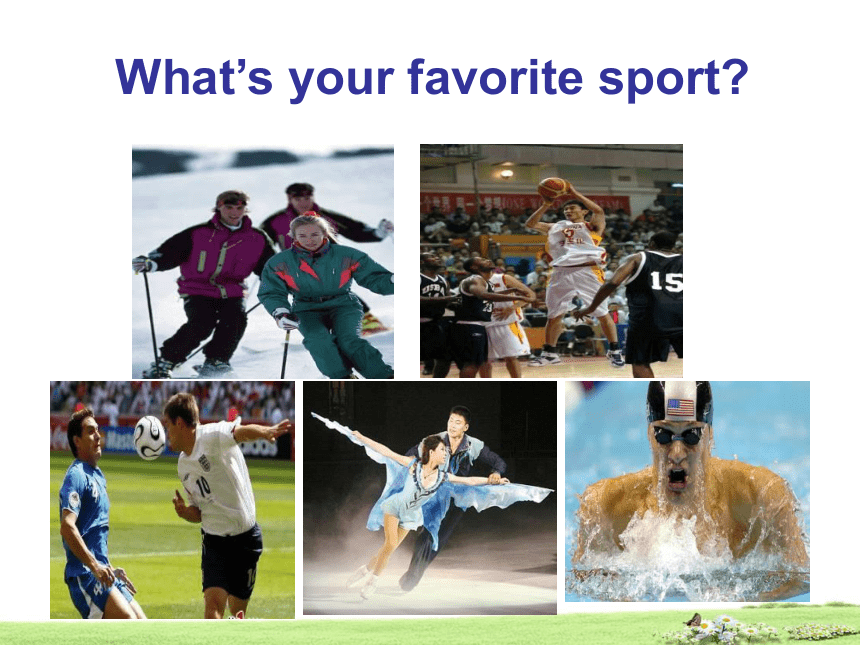

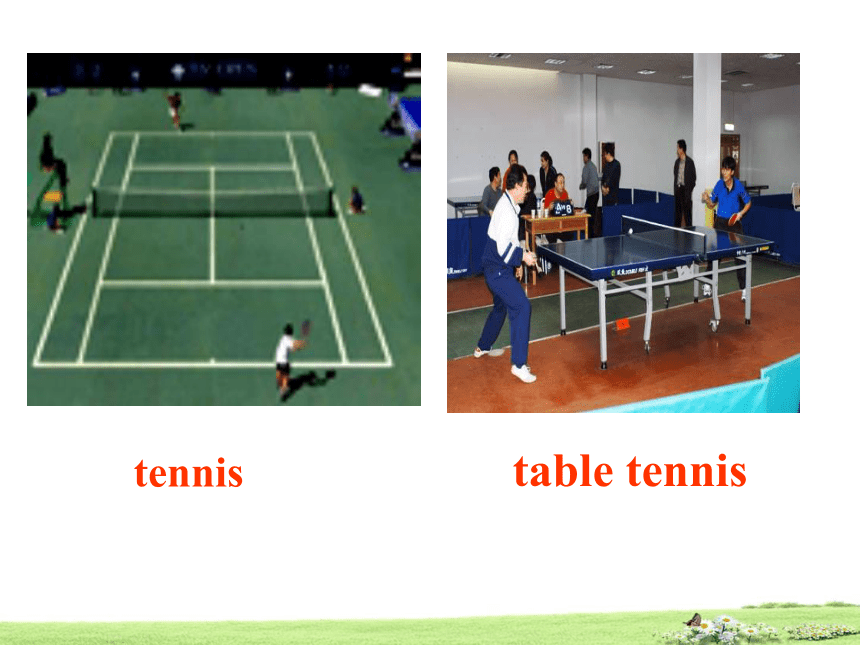


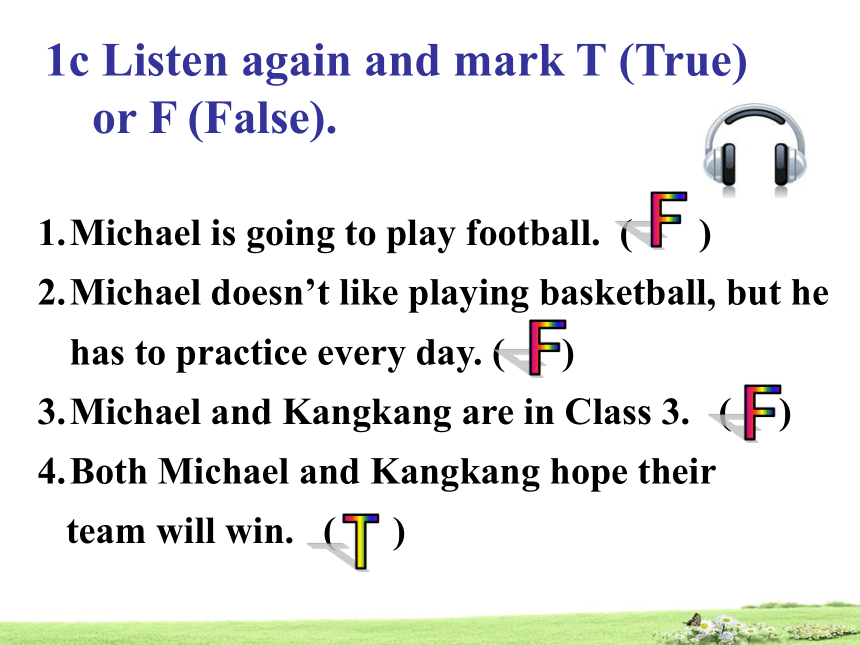
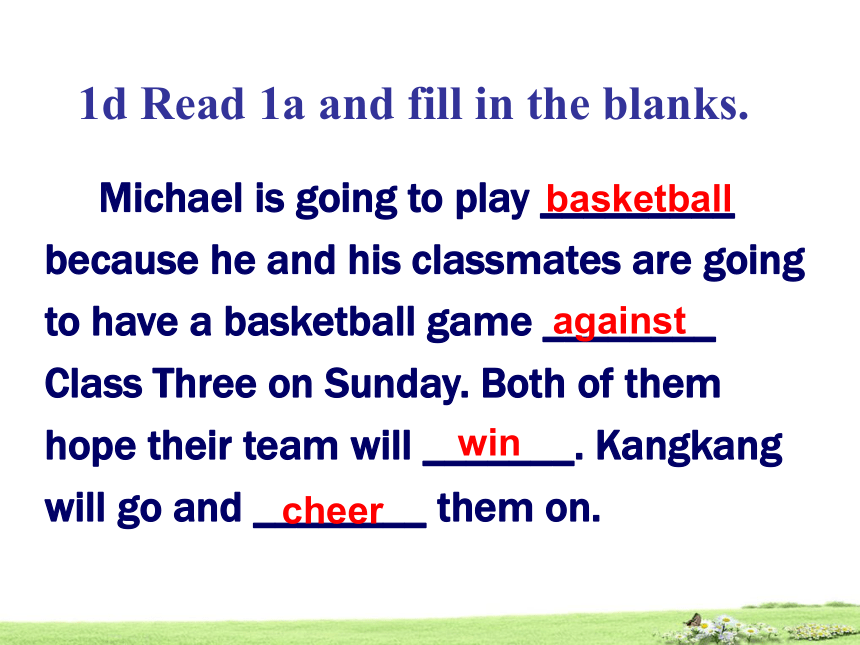
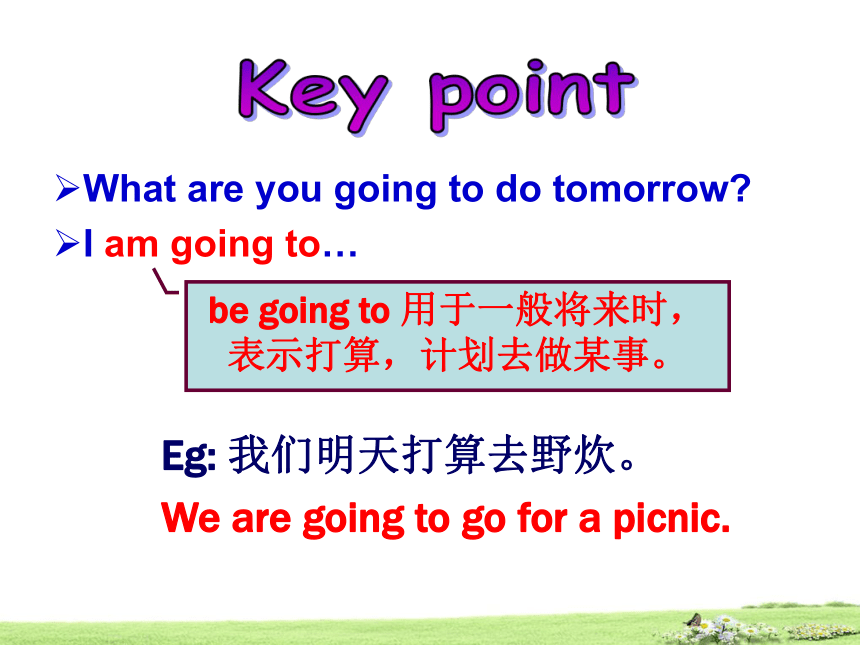
文档简介
(共42张PPT)
Review these sports:
basketball
football
volleyball
baseball
swimming
boating
(rowing)
What’s your favorite sport?
Learn some other sports:
cycling
skating
tennis
table tennis
a basketball team
Do you prefer playing basketball?
Are you going to join the school
basketball team?
1b Listen to 1a and choose the correct
answer.
Kangkang and Michael are talking
about _________.
the football game on Saturday
the summer holidays
the football game on Sunday
the basketball game on Sunday
1c Listen again and mark T (True)
or F (False).
Michael is going to play football. ( )
Michael doesn’t like playing basketball, but he has to practice every day. ( )
Michael and Kangkang are in Class 3. ( )
Both Michael and Kangkang hope their
team will win. ( )
1d Read 1a and fill in the blanks.
Michael is going to play _________ because he and his classmates are going to have a basketball game ________ Class Three on Sunday. Both of them hope their team will _______. Kangkang will go and ________ them on.
basketball
against
win
cheer
What are you going to do tomorrow?
I am going to…
be going to 用于一般将来时,表示打算,计划去做某事。
Eg: 我们明天打算去野炊。
We are going to go for a picnic.
be going to do sth. 这一结构表示打算或准备做某事,它是一般将来时的基本结构。
e.g. He is going to swim this morning.
There is going to be … 将有……
e.g. There is going to be a concert in our school next week.
see sb. do sth. 意为“看见某人做某事”。表示看见、行动的全过程,动作已经结束。
e.g. He saw a girl pick many flowers.
see sb. doing sth. 意为“看到某人正在做某事”。强调事件、行动正在进行。
e.g. I saw a thief stealing a woman’s purse in the bus.
2 look at the picture and make up conversations with your partner.
Example:
A: Which sport do you prefer, swimming or rowing?
B: I prefer rowing.
A: Do you row much?
B: Yes, quite a bit/a lot. / No, seldom.
A: Are you going to join the school rowing club?
B: Yes, I am. / No, I’m not. I’m going to …
sports
table tennis
swimming
skating
cycling
rowing
tennis
3a Listen to the conversation and
complete the table.
skating
8:00 a.m.
food, drinks, a camera
playing basketball
tomorrow afternoon
water, fruit
Name Sport Time What to take
Sally
Bob
3b Pair work
Names Favorite Sports
Lily My favorite sport is playing
volleyball.
Make dialogs after the example
For example:
A: Which sports do you like better,
skating or playing volleyball?
B: I like playing volleyball better.
1
Which sport do you like better …or…?
I like … better.
— Which sport do you prefer, … or …?
— I prefer …
skating
skiing
— Which sport do you prefer, … or …?
— I prefer …
cycling
climbing
playing baseball
hiking
— Which sport do you prefer, … or …?
— I prefer …
playing basketball
playing soccer
— Which sport do you prefer, … or …?
— I prefer …
playing volleyball
running
— Which sport do you prefer, … or …?
— I prefer …
Do you row much?
提示词
basketball
football
swimming
running
volleyball
table tennis
cycling
rowing
skating
skiing
Yes, quite a bit/a lot.
Do you … much?=Do you often…?
Yes, quite a bit/a lot.=Yes, I do.
No, seldom.=No, I don’t.
No, seldom.
很少
Are you going to join the school swimming team?
Yes, I am.
提示词
basketball
football
swimming
running
volleyball
table tennis
cycling
rowing
skating
skiing
No, I’m not. I’m going to …
Make a dialog with your partner, using the following sentences.
A: Which sport do you prefer … or …?
B: I prefer …
A: Do you … much?
B: Yes, quite a bit/a lot. / No, seldom.
A: Are you going to join the school … team?
B: Yes, I am. / No, I’m not. I’m going to …
2
队,组
Do you row much? 你经常划船吗?
在肯定句、否定句或疑问句中, (very) much 常与动词连用,用来描述某个动作发生的频率,或与表示情感的动词连用,表示情感的深浅程度。
e.g. I go to the movies much.
I don’t like ice cream much.
quite a bit/a lot 许多,大量;quite a lot of 后既可接可数名词也可接不可数名词。
e.g. He read quite a lot of books.
We got quite a lot of information on the Internet.
quite a few 意为“相当多、颇有几个”。后接可数名词的复数。
e.g. Quite a few students are doing voluntary work.
join sb 表示“加入某人的行列,和某人一起”。
join +组织,表示“加入某个组织”。
join in +活动,表示“参加某项活动”。
e.g. Will you join us?
He joined the school basketball club yesterday.
Can I join in the game?
We learn:
the future tense with “be going to”.
We can:
1. talk about sports and games.
2. talk about preferences.
1.What are you going to ____ tomorrow?
do B. does C. is D. be
2.---Are you going to join the school cycling team?
---- _____ I am going to join the swimming team.
Yes, I am. B. Yes, you are.
C. No, I’m not. D. No, you aren’t.
3.---Would you like to come and cheer Jim on?
---- _______
Yes, I will. B. Yes, I would.
C. Sure, I’d love to. D. Yes, I do.
1. There are 24 h_____ in a day.
2. I p______ playing volleyball to playing soccer.
3. She likes skiing. She wants to j____ the skiing club.
4. I s___ you go to school early every morning.
5. Michael Jordan is a f_______ basketball star.
ours
refer
oin
ee
amous
Finish the words according to the first given letter.
Translate these sentences into English.
1. 你打算去打排球吗?
2. 她喜欢骑自行车多于划船。
Are you going to play volleyball?
She prefers cycling to rowing.
3. — 你愿意加入我们学校的足球俱乐部吗?
— 是的,我非常愿意。
4. 上学期我几乎每个星期都回家。
— Would you like to join our school football
club?
— Yes, I’d love to.
I went home almost every week last term.
All our class will cheer our school swimming team on.
There is going to be a basketball match between Class Seven and Class Eight this afternoon.
He goes to play table tennis quite a lot/bit.
I hope our class will win.
5. 我们全班都将为我们学校游泳队加油。
6. 今天下午七班和八班将会有一场篮球比赛。
7. 他经常去打乒乓球。
8. 我希望我们班会赢。
1.用be going to造五个句子,要求用不同的人称、句式。
2.仿照 1a 与同桌进行对话。
Review these sports:
basketball
football
volleyball
baseball
swimming
boating
(rowing)
What’s your favorite sport?
Learn some other sports:
cycling
skating
tennis
table tennis
a basketball team
Do you prefer playing basketball?
Are you going to join the school
basketball team?
1b Listen to 1a and choose the correct
answer.
Kangkang and Michael are talking
about _________.
the football game on Saturday
the summer holidays
the football game on Sunday
the basketball game on Sunday
1c Listen again and mark T (True)
or F (False).
Michael is going to play football. ( )
Michael doesn’t like playing basketball, but he has to practice every day. ( )
Michael and Kangkang are in Class 3. ( )
Both Michael and Kangkang hope their
team will win. ( )
1d Read 1a and fill in the blanks.
Michael is going to play _________ because he and his classmates are going to have a basketball game ________ Class Three on Sunday. Both of them hope their team will _______. Kangkang will go and ________ them on.
basketball
against
win
cheer
What are you going to do tomorrow?
I am going to…
be going to 用于一般将来时,表示打算,计划去做某事。
Eg: 我们明天打算去野炊。
We are going to go for a picnic.
be going to do sth. 这一结构表示打算或准备做某事,它是一般将来时的基本结构。
e.g. He is going to swim this morning.
There is going to be … 将有……
e.g. There is going to be a concert in our school next week.
see sb. do sth. 意为“看见某人做某事”。表示看见、行动的全过程,动作已经结束。
e.g. He saw a girl pick many flowers.
see sb. doing sth. 意为“看到某人正在做某事”。强调事件、行动正在进行。
e.g. I saw a thief stealing a woman’s purse in the bus.
2 look at the picture and make up conversations with your partner.
Example:
A: Which sport do you prefer, swimming or rowing?
B: I prefer rowing.
A: Do you row much?
B: Yes, quite a bit/a lot. / No, seldom.
A: Are you going to join the school rowing club?
B: Yes, I am. / No, I’m not. I’m going to …
sports
table tennis
swimming
skating
cycling
rowing
tennis
3a Listen to the conversation and
complete the table.
skating
8:00 a.m.
food, drinks, a camera
playing basketball
tomorrow afternoon
water, fruit
Name Sport Time What to take
Sally
Bob
3b Pair work
Names Favorite Sports
Lily My favorite sport is playing
volleyball.
Make dialogs after the example
For example:
A: Which sports do you like better,
skating or playing volleyball?
B: I like playing volleyball better.
1
Which sport do you like better …or…?
I like … better.
— Which sport do you prefer, … or …?
— I prefer …
skating
skiing
— Which sport do you prefer, … or …?
— I prefer …
cycling
climbing
playing baseball
hiking
— Which sport do you prefer, … or …?
— I prefer …
playing basketball
playing soccer
— Which sport do you prefer, … or …?
— I prefer …
playing volleyball
running
— Which sport do you prefer, … or …?
— I prefer …
Do you row much?
提示词
basketball
football
swimming
running
volleyball
table tennis
cycling
rowing
skating
skiing
Yes, quite a bit/a lot.
Do you … much?=Do you often…?
Yes, quite a bit/a lot.=Yes, I do.
No, seldom.=No, I don’t.
No, seldom.
很少
Are you going to join the school swimming team?
Yes, I am.
提示词
basketball
football
swimming
running
volleyball
table tennis
cycling
rowing
skating
skiing
No, I’m not. I’m going to …
Make a dialog with your partner, using the following sentences.
A: Which sport do you prefer … or …?
B: I prefer …
A: Do you … much?
B: Yes, quite a bit/a lot. / No, seldom.
A: Are you going to join the school … team?
B: Yes, I am. / No, I’m not. I’m going to …
2
队,组
Do you row much? 你经常划船吗?
在肯定句、否定句或疑问句中, (very) much 常与动词连用,用来描述某个动作发生的频率,或与表示情感的动词连用,表示情感的深浅程度。
e.g. I go to the movies much.
I don’t like ice cream much.
quite a bit/a lot 许多,大量;quite a lot of 后既可接可数名词也可接不可数名词。
e.g. He read quite a lot of books.
We got quite a lot of information on the Internet.
quite a few 意为“相当多、颇有几个”。后接可数名词的复数。
e.g. Quite a few students are doing voluntary work.
join sb 表示“加入某人的行列,和某人一起”。
join +组织,表示“加入某个组织”。
join in +活动,表示“参加某项活动”。
e.g. Will you join us?
He joined the school basketball club yesterday.
Can I join in the game?
We learn:
the future tense with “be going to”.
We can:
1. talk about sports and games.
2. talk about preferences.
1.What are you going to ____ tomorrow?
do B. does C. is D. be
2.---Are you going to join the school cycling team?
---- _____ I am going to join the swimming team.
Yes, I am. B. Yes, you are.
C. No, I’m not. D. No, you aren’t.
3.---Would you like to come and cheer Jim on?
---- _______
Yes, I will. B. Yes, I would.
C. Sure, I’d love to. D. Yes, I do.
1. There are 24 h_____ in a day.
2. I p______ playing volleyball to playing soccer.
3. She likes skiing. She wants to j____ the skiing club.
4. I s___ you go to school early every morning.
5. Michael Jordan is a f_______ basketball star.
ours
refer
oin
ee
amous
Finish the words according to the first given letter.
Translate these sentences into English.
1. 你打算去打排球吗?
2. 她喜欢骑自行车多于划船。
Are you going to play volleyball?
She prefers cycling to rowing.
3. — 你愿意加入我们学校的足球俱乐部吗?
— 是的,我非常愿意。
4. 上学期我几乎每个星期都回家。
— Would you like to join our school football
club?
— Yes, I’d love to.
I went home almost every week last term.
All our class will cheer our school swimming team on.
There is going to be a basketball match between Class Seven and Class Eight this afternoon.
He goes to play table tennis quite a lot/bit.
I hope our class will win.
5. 我们全班都将为我们学校游泳队加油。
6. 今天下午七班和八班将会有一场篮球比赛。
7. 他经常去打乒乓球。
8. 我希望我们班会赢。
1.用be going to造五个句子,要求用不同的人称、句式。
2.仿照 1a 与同桌进行对话。
同课章节目录
- Unit 1 Playing Sports
- Topic 1 I'm going to play basketball.
- Topic 2 I'll kick you the ball again.
- Topic 3 The school sports meet is coming.
- Unit 2 Keeping Healthy
- Topic 1 You should brush your teeth twice a day.
- Topic 2 I must ask him to give up smoking.
- Topic 3 Must we exercise to prevent the flu?
- Unit 3 Our Hobbies
- Topic 1 What's your hobby?
- Topic 2 What sweet music!
- Topic 3 What were you doing at this time yesterday
- Unit 4 Our World
- Topic 1 What's the strongest animal on the farm?
- Topic 2 How can we protect ourselves from the eart
- Topic 3 The Internet makes the world smaller.
